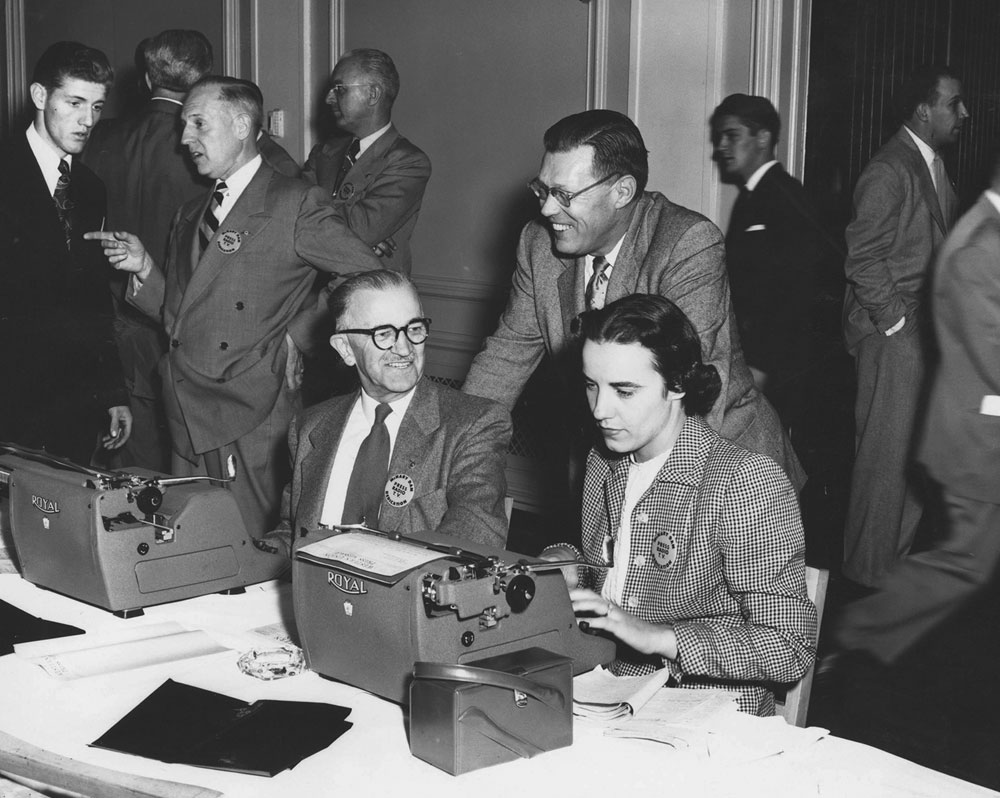- Editorial Offices
- 325 Brantly Hall
- Missoula, MT 59812
- (406) 243-2488
- themontanan@umontana.edu
- Icons By Maria Maldonado
UM alum, legendary journalist makes seven-figure estate gift

Legendary newspaperwoman and University of Montana alumna Dorothy Rochon Powers broke glass ceilings throughout the course of her storied career.
1959: First woman to win the Human Interest Storytelling Ernie Pyle Award. 1977: First woman to serve as The Spokane Spokesman-Review’s editorial page editor. 1979: First female president of the UM Foundation Board of Trustees.
Always leading the way, she served as an inspiration to countless journalists through her dogged nature and fearless, yet compassionate, reporting. Today, even after her passing in 2014, Powers inspires others to make a difference. She and her husband, Elwood, made a provision in their will to support incoming UM students.
Their estate gift of $1.3 million has created the Elwood and Dorothy Rochon Powers Scholarship, which will be awarded to graduates of Montana high schools who show financial need and academic merit, and also will support general University scholarships.
“Dorothy was grateful for her journalism education,” says UM Professor Emeritus Carol Van Valkenburg, “but she wished to provide support that would allow all kinds of students to benefit, as she did, from the great education offered at UM.”
The impact of her generosity will be substantial, as scholarships are a key recruitment tool for the University, and financial assistance enables many students to go to college who otherwise couldn’t afford to attend.
Powers, who grew up in Anaconda, studied journalism at UM in the early 1940s, when few women entered the profession. Upon graduation in 1943, she immediately landed a reporting job at The Spokesman-Review. She covered everything from the courts to the stockyards, averaging an astonishing thirteen articles a day.
She went on to have a forty-year career at the newspaper that made her a beloved and celebrated local figure.
“I think Dorothy will probably be remembered as one of the legendary figures of Northwest journalism,” says former Spokesman-Review editorial board member Steve Witter in an article published after Powers’ death.
She specialized in stories that exposed the plight of people such as the mentally ill, homeless, or incarcerated. Her reporting was highly principled, and she was a natural leader in the newsroom and in the community.
She often credited her parents for instilling a love of literature and writing. Her father wrote dispatches from the Philippines and Cuba during the Spanish-American War, and he and Powers’ mother, a teacher, ensured she and her brother never lacked reading material.
She honored her father, who raised her after her mother died, with her first substantial gift to UM. In 1959, she donated the $1,000 prize from her Ernie Pyle Award to the University to establish the C.G. Rochon Scholarship, which supports Anaconda High School students who want to study journalism. That scholarship is still awarded to this day. This year’s recipient, Lacee Moodry, is a freshman from Anaconda.
Later, Powers pledged funds to name a room after her father in Don Anderson Hall, the School of Journalism building completed in 2007.
She said of that gift, “I consider it the most important achievement of my lifetime.”
“I am so happy with this job I practically sing all day long. As far as I’m concerned, there just is no equal to journalism as a profession.”
Dorothy Rochon, in a letter dated January 24, 1944